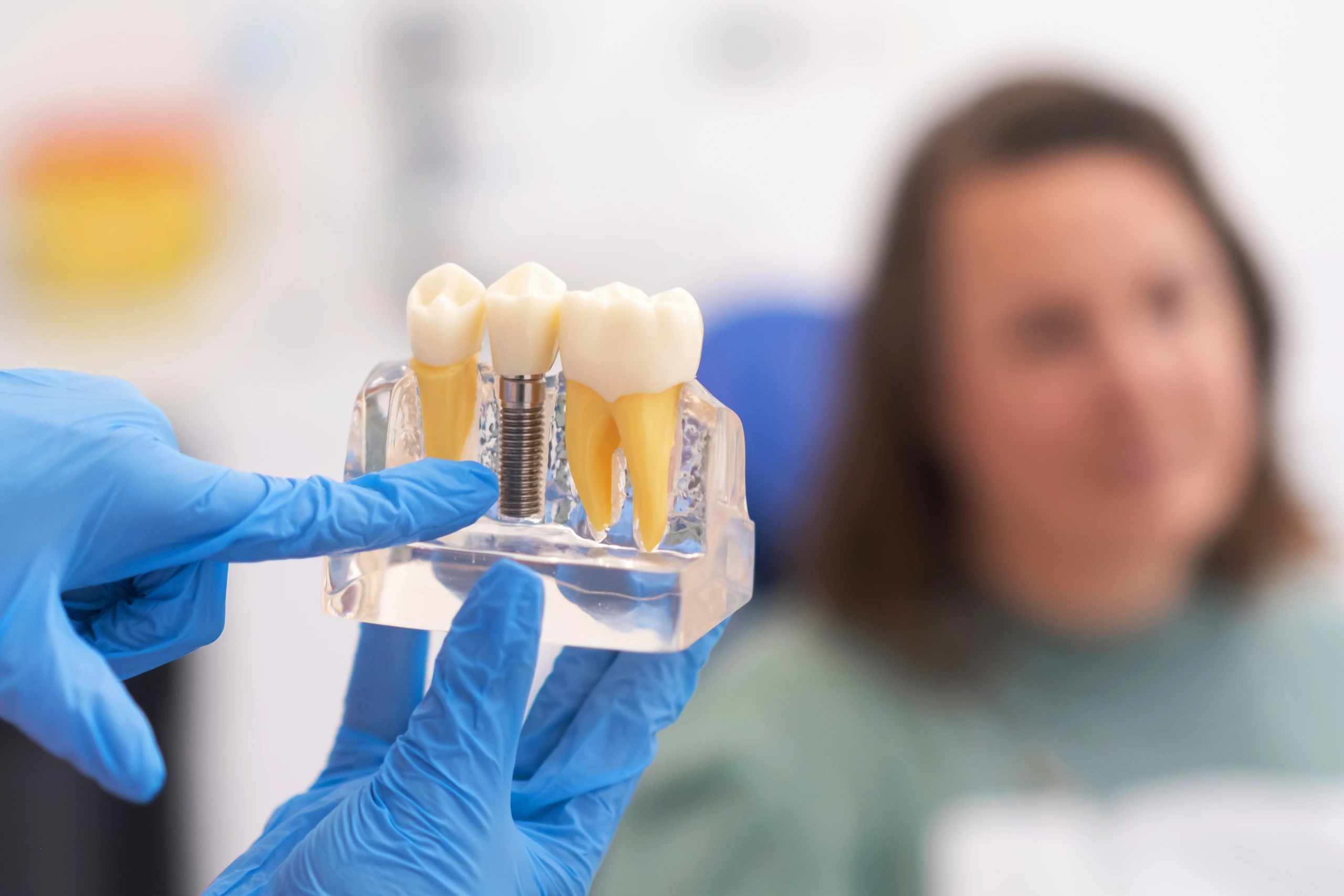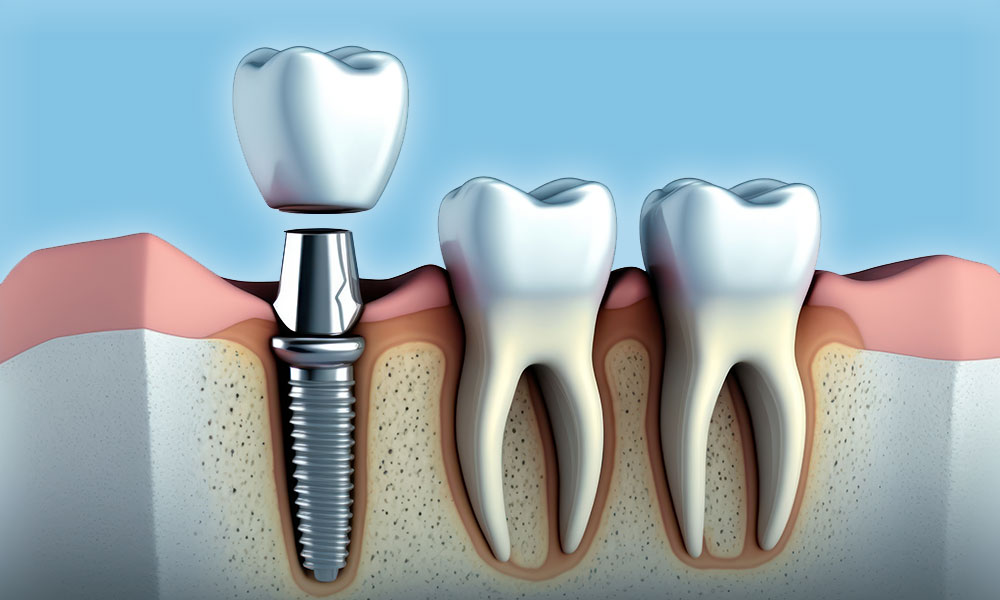Procedures
Dental Implants


Dental Implants Procedures at Argyle Associates
Dental implants are used during dental procedures to replace tooth roots with a metal-like post to support the new artificial tooth replacement. Dental implants are often an alternative to dentures or bridgework when those don’t work well with a patient or there’s a lack of teeth for the adherence of other dental solutions.
At Argyle Associates, we complete over 2000 implants every year. Dental implant surgery is a joint effort between an Oral and Maxillofacial Surgeon and a restorative dentist. One of our surgeons performs the dental extractions, any required bone grafting, and the actual placement of the dental implants. Once you have healed, a restorative dentist completed the dental implant process by inserting the replacement teeth.
Consultation
• An oral examination and x-rays of your mouth are taken
• Jawbone health is evaluated to determine if bone grafting is required
• A diagnosis and recommendation for treatment is given based on x-rays and evaluations.
• We will discuss the most appropriate anesthesia option for you.
Arriving at Your Surgery
• Wear loose and comfortable clothing and be sure that your sleeves allow access to your arm for an intravenous injection
• Our reception team will walk you through the check-in process
The Procedure
• The first part of the procedure will consist of a titanium implant being placed by an Oral and Maxillofacial surgeon into the jawbone.
• The second is an abutment, which fits over the portion of the implant that protrudes from the gum line.
• Finally, the crown or showing tooth replacement is placed which is created by a restorative dentist.
Dental Implants FAQs
WHAT IS A DENTAL IMPLANT?
Implants are one of the best ways to replace missing teeth. The root portion of a missing tooth is replaced by a surgically inserted titanium post which fuses to the jawbone. An abutment is placed on top of the implant, which connects the crown to the implant. The dental crown is a false tooth which is specifically shaped and designed to match the rest of your natural teeth.
There are several kinds of dental implant options. These include:
- Single implant and crown
- Bridge on implants
- Teeth in a day
- Zygomatic implant
HOW ARE DENTAL IMPLANTS DIFFERENT FROM DENTURES OR BRIDGES?
Dental implants and dental bridges are both solutions to replace missing teeth, however there are a few important differences between the two. Dental bridges consist of a false tooth or teeth which are held into place by dental crowns placed on natural teeth surrounding the missing tooth.
Dental implants look and perform more like natural teeth. They do not require anything to be placed on natural teeth, and they are inserted directly into the jawbone for maximum strength. Dental implants:
- Do not require artificial plastic to cover the roof of the mouth
- Do not require adhesives or denture creams
- Can minimize ongoing bone loss in the jaws while bridges require adjacent teeth to be filed down, dental implants do not impact healthy neighboring teeth.
ARE DENTAL IMPLANTS PAINFUL OR SENSITIVE?
Our patients typically report less discomfort and faster healing compared to the extraction of a tooth. We recommend mild pain relievers for two or three days following a dental implant procedure. After that time, patients are typically pain-free. Sensitivity is usually not an issue with dental implants.
HOW ARE DENTAL IMPLANTS CARED FOR?
WILL I BE WITHOUT TEETH FOR A WHILE?
Not necessarily. The bone requires some time to heal before your final tooth can be placed. This process can take several months. You may want a temporary denture or a partial denture made to hide the missing teeth until the process is complete. An immediate, temporary crown can sometimes be placed onto implants.
CAN I SWITCH TO IMPLANTS EVEN IF I HAVE BEEN WEARING DENTURES FOR MANY YEARS?
AM I TOO OLD FOR DENTAL IMPLANTS?
Health is a greater determining factor than age. If you are healthy enough to have a tooth extracted, you are probably healthy enough to receive dental implants. Dental implant treatment may not be recommended for patients suffering from some chronic illnesses. An examination by one of our surgeons, and a review of your dental and medical history, will help determine whether you qualify for an implant procedure. Most patients do qualify.
WHAT IF I AM A SMOKER?
Smoking does not prevent you from having implants. Smoking can increase the risk of complications with healing, and your surgeon will discuss these risks with you during your consultation.
HOW MUCH DO IMPLANTS COST?
The cost of treatment varies with the solution provided. During your consultation, we will present you with a range of dental implant options. We will explain all surgical fees in advance and will provide a written quotation that includes all aspects of the surgical treatment.
WILL MY INSURANCE COVER DENTAL IMPLANTS?
Some insurance companies offer partial reimbursement for dental implants. One of our treatment coordinators will facilitate communications between you, your dental office, our office, and your insurance company. We will ensure you are getting the maximum amount of coverage available to you.
The cost of dental implants is a medical expense that may be deductible for income tax purposes. If you own a business, additional tax advantages are possible. Discuss this with your accountant.
WHAT IS INVOLVED IN DENTAL IMPLANT SURGERY?
Dental Implant placement is a team effort between an oral and maxillofacial surgeon and a restorative dentist. Our surgeons perform the dental extractions, any necessary bone grafting, and actual placement of the dental implants. When you are healed, your dentist fabricates and inserts the replacement teeth.
We will begin with an oral examination and x-rays of your mouth. We will evaluate the health of your jawbone and extend of implants required.
Consultation
We will perform a clinical exam and also look at your x-rays. This will allow us to provide a diagnosis and recommend appropriate treatment options.
Anaesthesia
At your consultation we will discuss the most appropriate anaesthesia options for you. The options include local “freezing”, N2O “laughing gas”, IV sedation or general anesthesia.
Recovery
We will provide you with a prescription for pain medication, antibiotics if determined necessary by your surgeon, and detailed post-surgical instructions.
Follow-Up Visit
Your surgeon will determine appropriate timing for a follow-up visit. The surgeon will monitor your healing and answer any questions you may have at that time.
Possible Risks
Serious complications are uncommon. Excessive bleeding, numbness, prolonged pain, infection, implant failure, and sinus complications can sometimes occur.
WHAT IS ARGYLE ASSOCIATES’ EXPERIENCE IN DENTAL IMPLANTS?
On average, our surgeons place over 2,000 implants each year. It is one of the most common procedures we perform. As a result, we are able to offer this service with a high level of efficiency and with minimal complications.
WHAT ARE POST-OPERATION INSTRUCTIONS FOR DENTAL IMPLANTS?
After your dental implant procedure, your doctor will inform you of the post-operation steps you should take to promote healing for your specific case.
Read more about dental implant post-operation instructions.

